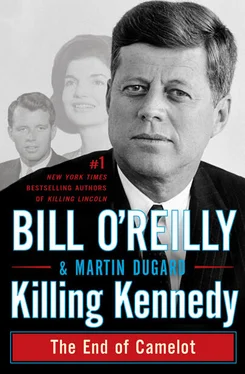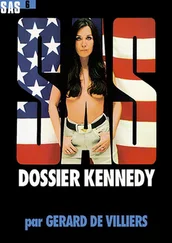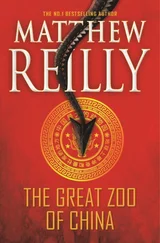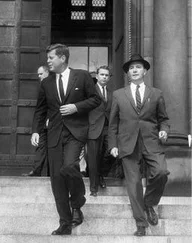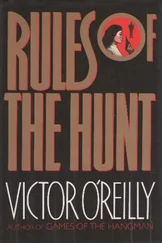Finally, the new president spies his young wife just behind Justice Warren’s left shoulder. Jackie Kennedy is radiant in her taupe suit and matching hat. Dark brown hair and a fur collar frame her unlined face. Her amber eyes sparkle with excitement; she is not showing a hint of fatigue despite having stayed up until 4:00 A.M. The booze flowed freely at preinaugural celebrations thrown by the likes of Frank Sinatra and Leonard Bernstein. Jackie returned to their house in Georgetown long before the parties wound down, but her husband did not accompany her. When Jack finally showed up, just before 4:00 A.M., he found his wife wide awake, too excited to sleep. As the snow continued to fall on the stranded motorists and the impromptu bonfires lining the streets of Washington, the young couple sat together in early-morning conversation. He told her about a late dinner organized by his father, and they talked with excitement about the inauguration ceremony. It would be an extraordinary day, with the promise of many more to come.
John F. Kennedy well understands that the public adores Jackie. Just last night, when crowds on the snowy Washington streets glimpsed the Kennedys driving past in their limousine, the president-elect asked that the inside lights be turned on so that the people might glimpse his wife. Jackie’s glamour, sense of style, and beauty have captivated America. She speaks fluent French and Spanish, secretly chain-smokes filtered cigarettes, and prefers champagne to cocktails. Like her husband, Jackie has a dazzling smile, but she is the introvert to his extrovert. Her trust in outsiders is scant.
Despite her glamorous image, Jackie Kennedy has already known great tragedy during their seven years of marriage. She miscarried their first child, and the second was a stillborn baby girl. But she has also enjoyed the birth of two healthy children, Caroline and John Jr., and the stunning ascension of her dashing young husband from a Massachusetts politician to president of the United States.
The sadness is now behind her. The future looks limitless and bright. The Kennedy presidency seems destined to be, in the words of a new hit play that just opened at Broadway’s Majestic Theater, much like the mythical Camelot, a place where “there’s simply not a more congenial spot, for happily-ever-aftering.”
* * *
“Preserve, protect and defend the Constitution of the United States…”
“Preserve, protect and defend the Constitution of the United States…”
Kennedy’s predecessor, Dwight Eisenhower, stands next to Jackie. Behind Kennedy stand Lyndon Johnson, Richard Nixon, and Harry Truman.
Normally, having just one of these dignitaries at an event means heightened security. Having all of them at the inaugural, sitting so closely together, is a security nightmare.
The Secret Service is on high alert. Its job is to protect the president. The fifty-five-year-old career agent and leader of the service, Chief U. E. Baughman, has been in charge since Truman was president. He believes that Kennedy’s athleticism and fondness for wading into crowds will make guarding him a challenge unlike any other in the Service’s history. The lean Baughman, with his trademark crew cut, almost cleared the inaugural stand three times today out of concern for presidential safety. On one occasion, blue smoke poured from the lectern during the invocation, and there was fear that it was a bomb. Agents rushed to investigate. As it turned out, the smoke came from the motor that raised and lowered the lectern. Stopping the problem was as simple as turning off the motor. Now Baughman’s agents scan the crowd, nervous about the close proximity of the vast audience. One well-trained zealot with a pistol could kill the new president, two former presidents, and a pair of vice presidents with five crisp shots.
Baughman is well aware of another chilling fact. Since 1840, every president elected in a twenty-year cycle has died in office: Harrison, Lincoln, Garfield, McKinley, Harding, and Roosevelt. Yet no president has been assassinated for almost sixty years, thanks to the expertise of the Secret Service. Just last month, agents foiled an attempt on Kennedy’s life by a disgruntled former postal worker who planned to blow him up with dynamite. Nonetheless, Baughman is faced with a haunting question: Will the chain of presidential deaths be broken, or will Kennedy be its next link?
JFK laughs off suggestions that he might die in office. Just to prove that he isn’t a believer in omens, the new president has chosen to sleep in the Lincoln Bedroom during his first few nights in the White House—the ghost of Abe apparently of no concern.
“So help you God.”
“…So help me God.”
The oath complete, Kennedy shakes Chief Justice Warren’s hand, then those of Johnson and Nixon. Finally, he stands toe to toe with Eisenhower. The two men smile cordially, but there is steel in their eyes. Eisenhower’s condescending nickname for Kennedy is “Little Boy Blue.” He thinks him callow and incapable of governing, and finds it galling that a man who was a mere lieutenant during the Second World War is taking over the presidency from the general who directed the D-Day invasion. For his part, Kennedy sees the old general as a man little interested in righting the wrongs of American society—a top priority for JFK.
Kennedy is the youngest president ever elected. Eisenhower is the oldest. The great divide in their ages also represents two very different generations of Americans—and two very different views of America. In just a moment, Kennedy will deliver an inaugural address that will make those differences clearer than ever.
The thirty-fifth president of the United States lets go of Eisenhower’s hand. He pivots slowly to his left and stands at the podium bearing the presidential seal. Kennedy looks down at his speech, then lifts his eyes and gazes out at the thousands of frozen faces before him, knowing that the crowd is impatient. The ceremony started late, the invocation by Cardinal Richard Cushing was extremely long, and the eighty-six-year-old poet Robert Frost was so blinded by the sun that he was unable to read the special verses he’d written for the occasion. Nothing, it seems, has gone according to plan. What these freezing people long for is something redemptive. Some words that will signal a shift from the stagnant state of Washington politics. Words that will heal a nation divided by McCarthyism, terrified of the cold war, and still struggling with racial segregation and discrimination.
Kennedy is a Pulitzer Prize–winning historian, having received the award for his book Profiles in Courage . He knows the value of a great inaugural address. For months he has fussed over the words he is about to recite. Just last night, when the lights were turned on inside the car to make Jackie visible to onlookers, he reread Thomas Jefferson’s inaugural address—and found his own lacking by comparison. This morning, he rose after just four hours of sleep and, pencil in hand, scrutinized his speech again and again and again.
His words resonate like a psalm. “Let the word go forth from this time and place, from friend and foe alike, that the torch has been passed to a new generation of Americans—born in this century, tempered by war, disciplined by a hard and bitter peace, proud of our ancient heritage…”
This is no ordinary inaugural address. This is a promise. America’s best days are still to come, Kennedy is saying, but only if everyone pitches in to do his part. “Ask not what your country can do for you,” he commands, his voice rising to deliver the defining sentence, “but what you can do for your country.”
The address will be hailed as an instant classic. In less than 1,400 words, John Fitzgerald Kennedy defines his vision for the nation. He now sets the speech aside, knowing that the time has come to fulfill the great promise he has made to the American people. He must manage the issue with Cuba and its pro-Soviet leader, Fidel Castro. He must tackle problems in a faraway land known as Vietnam, where a small band of U.S. military advisers is struggling to bring stability to a region long rocked by war. And here at home, the power of the Mafia crime syndicates and the divisiveness of the civil rights movement are two crucial situations requiring immediate attention. And on a much more personal level, he must negotiate the animus between Attorney General Bobby Kennedy and Vice President Lyndon Johnson, who despise each other.
Читать дальше
